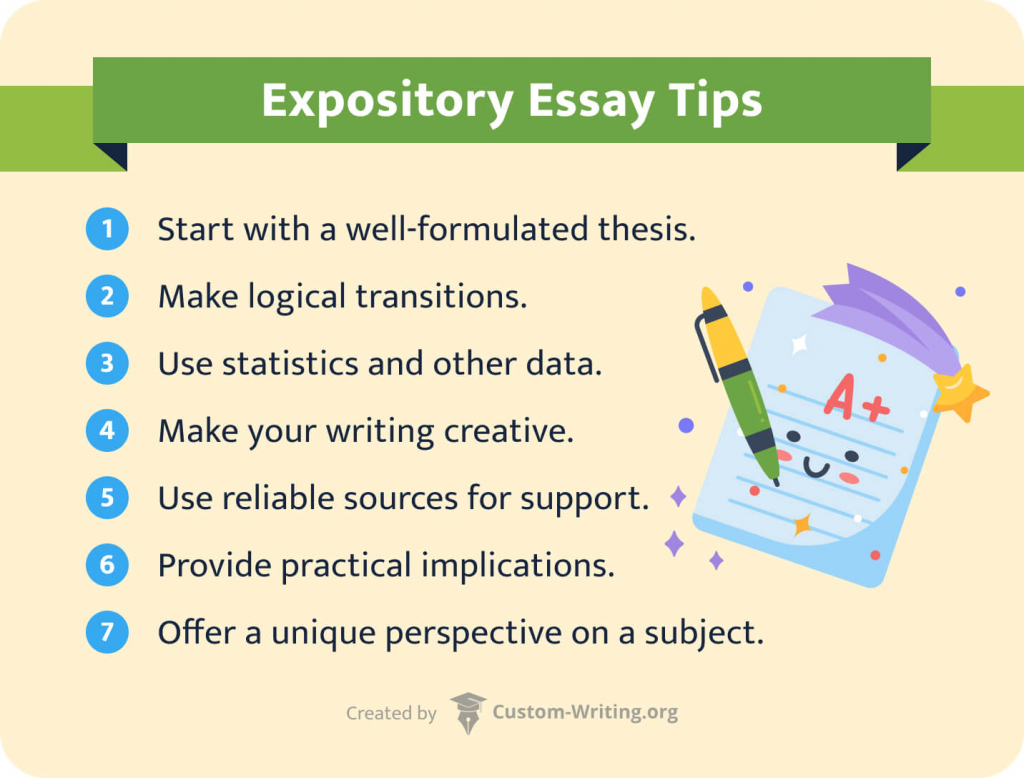Expository essay topics require students to clarify or describe a specific subject using facts, examples, and explanations, not personal opinions. These assignments are designed to deliver clear, logical information and are staples in academic settings across all levels.
Here are a few examples of expository writing topics:
- How does the human brain store memories?
- The invention of the Internet
- The benefits of regular exercise
Since expository writing can feel unfamiliar or even intimidating, especially for those more used to argumentative styles, our custom writing service is here to help. This article features a rich collection of expository essay ideas suitable for high school and university students. Besides, you’ll find here tips on how to choose good expository essay topics and practical writing advice to guide the process.
🌟 25 Best Expository Essay Topics for 2026
Are you looking for engaging and up-to-date expository writing topics? Our experts have hand-picked a list of trending and interesting topic ideas for 2026:
- Significance of regular physical activity for mental health.
- The role of ChatGPT in the global unemployment dynamics.
- Coping with Stress at University.
- Consequences of deforestation.
- Distant learning: A modern approach to education.
- Healthy Nutrition During Pregnancy.
- COVID-19 pandemic and its long-term effects.
- The increasing role of AI in everyday life.
- A Hero: Character Definition in Literature.
- The role of plant photosynthesis in the global ecosystem.
- Benefits of increasing renewable energy use worldwide.
- Michelangelo and Later Renaissance Art.
- Pros and cons of remote work.
- Why Businesses Should Embrace Remote Work?
- Impact of social media influencers on public opinion.
- Religion Role in the Society.
- Effects of the Industrial Revolution on the modern world.
- Aesthetics: The Theory of Beauty.
- The growing importance of financial literacy.
- Impact of video games on cognitive development.
- American Hard Rock in Relation to Society.
- Music’s effects on mood and emotional balance.
- Cardiovascular Diseases: Causes and Risk Factors.
- Significance of Magna Carta for protecting freedoms and rights in the UK.
- Nutrition Research: Grapefruit Diet for Weight Loss.
🔍 Choosing a Topic for Expository Essay
While selecting a topic for your expository essay, it’s essential to be careful and take some time to think. A well-chosen topic will allow you to create a logical and coherent piece within the given word count without struggling to find relevant data and details. It’s best to make sure there are enough reliable sources and factual information available on the subject before choosing it. Use only credible sources to provide readers with a good-quality paper. There are 6 types of expository writing you may consider:
- Process. Explanation of some complicated process or algorithm, with a clear breakdown of steps involved in it.
- Cause and effect. Exploration of cause-and-effect relationships between phenomena or objects.
- Descriptive. Description of people, events, or things.
- Comparative and contrast. Comparison and contrast of features that two or more objects possess.
- Problem and solution. Discussion of various issues and solutions to them.
- Classification. Classification of objects.
Remember that expository writing should present facts and describe events without expressing opinions. It’s essential to refrain from incorporating persuasive elements and adhere to a linear and logical structure to provide data and educate your readers.
🎒 Short Expository Topics for Middle School
The middle school encompasses years 5, 6, and 7, developing students’ clear and objective expression skills. Expository writing at this level nurtures the ability to formulate coherent thoughts without personal judgment. Middle school students may be tasked to write essays on various subjects such as biology, math, physics, music, science, computer science, social studies, and language studies. Here is a diverse list of topics and ideas you can use for your next assignment:
- Causes of stress for teenagers.
- Self-Esteem Role in Stress Management.
- Qualities in teachers that inspire students.
- Emotional Intelligence: Importance in Teamwork.
- When is it appropriate for a parent to behave strictly?
- Effects of music on people’s well-being.
- The Art of Writing and Storytelling.
- Leadership traits across cultures.
- Leadership in the 21st Century.
- Minimal driving age across countries.
- Working in a team: Pros and cons.
- Teamwork and Collaboration in Nursing.
- Causes of teen suicide.
- Solutions to school bullying.
- The Relation Between the Teen Suicide and Bullying.
- Factors explaining people’s music preferences.
- Legal consequences of drug dealing.
- Relationship between Asthma and Smoking.
- Causes of teen drug addiction.
- Incidence of early tobacco smoking onset among teenagers in European countries.
- The US Veterans: The Problem of Tobacco Smoking.
- How playing truant may affect your future career success.
- Teenagers and birth control: Causes of refusal to use birth control.
- Birth Control and Christian Faith.
- Effects of marijuana use on teens.
- Bioethics: The Use of Marijuana for Medical Purposes.
- Problems of Open Lunch Policies at Schools.
- Coping mechanisms of children during parental divorce.
- Juvenile Delinquents and Parental Divorce: What Is the Connection?
- Things characterizing a happy world.
- School uniform practices across states.
- American School Uniforms and Academic Performance.
- Significance of DNA replication.
- The process of natural selection and evolution.
- Effects of globalization on third-world countries.
- The Main Features of the European Renaissance.
- The cultural significance of the Renaissance.
- Renaissance Artists: Palmer Hayden and Jacob Lawrence.
- Impact of fast food on child health.
- Eating Fast Food and Obesity Correlation Analysis.
- Causes of World War II.
- Battle of the Bulge During World War II.
- U.S Atomic Bombing of Hiroshima and Nagasaki.
- Benefits and downsides of using GMO products.
- Solutions to plastic pollution.
- Water Pollution Causes, Effects and Solutions.
- Civil rights movement and its historical significance.
- Women Role in the Civil Rights Movement.
- Process of developing and testing a vaccine.
- Impact of AI on education.
- Artificial Intelligence: Ethical, Social, Legal Issues.
- Pros and cons of online-only learning.
- The efficiency of homeschooling.
- Long-term effects of smoking on people’s health.
- Process of discovering new species.
- Dangers of New Species to Native Members.
- How do social norms on individual behavior?
- Role of effective communication in interpersonal relationships.
- Education & Interpersonal Relationships in Family.
- What led the USA to the Great Depression?
- The cultural footprint of hip-hop music.
- Developing an Original Musical Instrumental.
- The algorithm of conducting a scientific study.
- Ethics in clinical research across countries.
- Types of Social Media Users.
- Pros and cons of intense and frequent social media use.
- Dynamics of mass surveillance in the 21st century.
- Marketing in the 21st Century.
- Modern surveillance methods and human privacy rights.
- The causes of the French Revolution.
- Effects of French Revolution on European Peasantry.
- Effects of social media on teen self-esteem.
- Pros and cons of school dress code.
- Tourism: Historical Trends and Developments in the 20th Century.
- The history of the rock’n’roll genre in the 20th century.
- Music of the 20th Century and Beyond.
- The algorithm of developing a computer program.
- Biology: Comparison and Contrast of Cats and Dogs.
- How does cell division occur in humans?
- Western Imperialism in the Early 20th Century.
🏫 Good Expository Topics for High School
High school signifies a higher level of academic study where expository essays must adhere to specific formatting guidelines and include a well-defined thesis statement. Compared to middle school, the range of subjects for expository assignments expands to fields like computer science, marketing, criminal justice, early childhood education, psychology, mental health, and more. To spark your creativity, here is a collection of topic ideas:
- The impact of cyberbullying on mental health.
- Phonemic Awareness and Children Literacy.
- Fundamentals of financial literacy education for high school students.
- Role of standardized testing in US education.
- Phenomenological and Experiential Approaches to Religious Education.
- Association between violent video games and teen aggression.
- How and Why TikTok Addiction Affects Academic Performance.
- The effect of regular sleep on academic performance.
- Excellent Academic Performance: Causes and Effects.
- The consequences of the American civil war for Great Britain.
- Peer pressure and teen decision-making.
- Rational Decision-Making Model.
- The positives of learning a foreign language for students’ intelligence.
- How does social media affect the political engagement of young adults?
- Social Media Tool in Modern Marketing.
- The development of scientific theory.
- Professional Judgement and Decision-Making in Social Work.
- Causes of rising teenage pregnancy rates in developed countries.
- Fast fashion and environmental issues.
- The Fast Fashion and Related Ethical Problems.
- The effects of adolescent substance use on intelligence.
- Fast Fashion and Its Impact on the Fashion Industry.
- The cultural significance of ancient Greece on modern civilization.
- Pros and cons of participation in school sports programs.
- Magic in Ancient Greece and Rome.
- Effects of carbon credit trading on the global carbon footprint.
- Modern advertising techniques and body image.
- Impact of Media on Body Image.
- The role of LGBTQI+ advancements in contemporary culture.
- Social inequality and academic achievement.
- Dyslexia, Academic Achievements and Self-Esteem.
- Mental health awareness programs in schools.
- Challenges of engaging in modern online activism.
- The cultural impact of Harlem Renaissance.
- Harlem Renaissance. Langston Hughes’ and Claude McKay’s Poems.
- The algorithm of patenting new technologies.
- Junk food advertising and children’s food choices.
- Consumption of Junk Foods and Their Threat to the Lives.
- The evolution of wildlife habitats related to climate change.
- The history of ancient Egyptian civilization.
- Conquest of Mexico and Downfall of the Aztec Empire.
- Media violence and real-life aggression.
- Your favorite place for spending summer vacations.
- Grief and Mourning in ‘Big Fish’ by Danielle Wallace.
- Benefits of having a pet.
- The value of true friendship.
- The Idea of Friendship in Literary Works.
- Talk about popular hobbies among teenagers today.
- Reading a book vs. watching a movie.
- Science Fiction in Literature and Movies.
- Working a part-time job at high school.
- Solutions to the current ecological crisis.
- Improving Ecological Awareness Through Education.
- Approaches to financial problems.
- Productive ways of expressing emotions.
- The Catholic Church and Western Classical Music.
- Approaches to addressing bullying as a victim and a witness.
- Causes of teens’ love for rock music.
- Formation and Weathering of Rocks.
- Significance of scientific and technological progress in the USA.
- Modern efforts for extraterrestrial life search.
- Attachment Theory and Personality Development.
- Stages of healthy and logical personality development.
- The Great Depression and Its Effects on Minorities.
- Effects of social media on traditional media.
- Ways to avoid depression and chronic stress.
- Impact of Depression on a Family.
- Methods of curing flu in record time.
- Conventional vs. alternative medicine.
- Factors associated with eating disorders.
- Alternative Medicine: Musical Therapy.
- Self-care approaches to depression treatment.
- Astronomy achievements in ancient Greece.
- Astronomy: The Theory of the Universe.
- Is living an eternal life possible?
- Methods of producing electronic music.
- Galileo’s Telescope for Astronomy and Cosmology.

📚 Interesting Expository Topics for College
Once you enter college, you can enroll in an expository writing course to refine your composition skills. This preparation equips you to handle all kinds of expository writings across various subjects, demanding a more in-depth and analytical approach. If you find yourself tasked with writing a college-level expository essay, our curated list of topics can serve as an inspiration:
- The theory behind the fourth dimension.
- Role of Dreams in Psychology.
- Significance of 4-year college degree programs.
- Ways of preventing child abuse.
- Aristotle’s Perspective on the Greek Tragedy.
- Role of career consultants in college.
- Sin of Betrayal in Alighieri’s “Divine Comedy.”
- The contribution of sociology to criminal justice.
- Pros and cons of veganism.
- Cosmetic Surgery History and Effects.
- Impact of ecotourism on GCC countries’ development.
- The economic impact of the Great Depression.
- Consumerism and Materialism.
- Religious affiliation of modern youth.
- Ayurvedic Medicine and Its Cultural Value.
- What factors lead to the demise of ancient empires?
- The timeline of the Arab-Israeli conflict.
- The Reproductive System. Endocrine Glands and Hormones.
- Main characteristics of the Stone Age.
- Origins of hippie culture.
- The Fall of the Roman Empire.
- Civil Rights Movement in the 20th and 21st centuries.
- The status of Native American tribes in the USA.
- The Theme of Love in Ancient Egyptian Poetry.
- Impact of populism on Western political systems.
- Gerrymandering’s effect on democracy.
- History of the Indian Ocean Trade.
- Importance of No Child Left Behind Act.
- Benefits of Montessori education.
- Does Technology Promote Loneliness?
- How does homeschooling affect academic attainment?
- Efficient methods for cyberbullying prevention.
- Medicinal Value of Tropical Rainforest Plants: A Reference to the Amazon Rainforests.
- Long-term consequences of GMO consumption.
- Approaches to treating insomnia.
- Revolutionary Communism vs. Democratic Socialism.
- The promise and reality of feminism.
- Watching Movies in Cinemas and at Home.
- The fundamentals of the clean needle program.
- Causes of the HIV epidemic in the modern world.
- Growth of Nuclear Weapons.
- The impact of increasing adoption of homosexuality.
- Is active social media use reasonable?
- “Beauty and the Beast”: Similar Fairytales in Europe and Asia.
- Ways of boosting the nation’s economy.
- E-business and traditional business approaches.
- The Characters Dreams in “A Raisin in the Sun” by Lorraine Hansberry.
- The rising popularity of stock markets.
- The economic and political impact of Panama Papers.
- Prison Culture: Term Definition.
- Popular leadership styles in the 21st century.
- Energy Flow in the Food Chain of Organisms in a Desert Ecosystem.
- Implications of using various business models.
- Role of active sports in student life.
- Chekhov’s “The Cherry Orchard”: Tragedy or Comedy?
- The features of animal bullying.
- Werewolves: Meaning Behind Monsters.
- Impact of human activities on the animal extinction dynamics.
- The efficiency of homeopathy in severe disease treatment.
- Iconography, Cuneiform Writing, and Spiritual Beliefs.
- The morality behind human cloning.
- The reasons to decriminalize prostitution.
- The Civil War. The Letters From the Soldiers.
- Sex work as a profession.
- Algebra – an Islamic Contribution to the West.
- Governmental funding of sports programs.
- How do sports boost the national economy?
- Effects of steroid use on physical and mental health.
- The usage of doping in professional sports: Legal consequences.
- Animal rights protection measures worldwide.
- Animal Themes in Mythology: The Fox.
- Emerging trends in psychology: Human dependence on computers and gadgets.
- The Greek Mythology and Myths.
- What are the ways to protect the ozone layer?
- Concepts of American Dreams.
- Stereotypes associated with Americans.
- Ways to manage cultural diversity in teams.
- World History: The Crusades, Humanism, and the Printing Press.
📝 Expository Writing Tips
Now that you have some topic ideas that you can use for your papers let us share some helpful tips that can make the process of writing even more efficient:
- Develop a clear thesis statement. A well-formulated thesis serves as the “face” of your essay, conveying its main idea.
- Make logical transitions. Connect parts of your essay to maintain a smooth flow and cohesiveness, linking the introduction, body, and conclusion in a reader-friendly manner.
- Incorporate evidence. Objective facts will help you focus on informative and educational content, avoiding personal opinions. Use reliable sources and substantial evidence to support your points.
- Inject creativity into your writing. Offering a unique perspective on mundane topics—present engaging statistics and facts to captivate readers and bring your subject to life.
- Pay special attention to your conclusion. It should go beyond a mere summary. Provide insightful inferences and discuss the practical and theoretical implications of your research.
With these insights into expository writing and various topic ideas, you’ll be well-equipped to tackle your assignments more efficiently. Feel free to share this article with others, apply these helpful tips to your writing, and enjoy improved grades from your professor.
❓ Expository Essay Topics: FAQ
What Is an Expository Essay?
An expository essay is an assignment high school, college, or university students can receive from a professor. It aims to test the student’s skill to explain and inform readers about a particular subject without persuading the audience to take some side or adopt the writer’s viewpoint. Its purpose is purely educational and informative.
How to Write Expository Essays?
To write a well-crafted expository essay, follow these steps:
- Start by selecting a focused, engaging topic that can be developed and discussed.
- Conduct thorough research to gather all the necessary details and facts about the subject, then create an outline to guide your writing process.
- Use this outline to construct a coherent and logically structured essay, ensuring smooth transitions between points.
How Does Narrative Differ from Expository Writing?
Narrative and expository essays have distinct purposes and structures. A narrative essay aims to recount personal experiences or present fictional stories, whereas expository essays inform and describe facts, objects, and phenomena. As a result, narrative essays typically follow a chronological structure to engage readers, while expository essays adopt a descriptive approach, providing ample details about the subject matter.
🔗 References
- Body Paragraphs – Purdue OWL® – Purdue University
- Strong Body Paragraphs | University of Washington
- How to Write a Hook Masterfully | Grammarly
- What Is Expository Writing?
- Expository Thesis Statements vs. Argumentative Thesis Statements; Freshman Composition
- Thesis Statements – The Writing Center • University of North Carolina at Chapel Hill
- How to Write a Thesis Statement: Writing Guides: Writing Tutorial Services: Indiana University Bloomington

![298 Hottest Cybersecurity Research Topics & Questions [2026]](https://custom-writing.org/blog/wp-content/uploads/2021/04/hacker-cracking-binary-code-data-security-284x153.jpg)


![Student Exchange Program (Flex) Essay Topics [2026]](https://custom-writing.org/blog/wp-content/uploads/2021/01/student-exchange-program-284x153.jpg)






